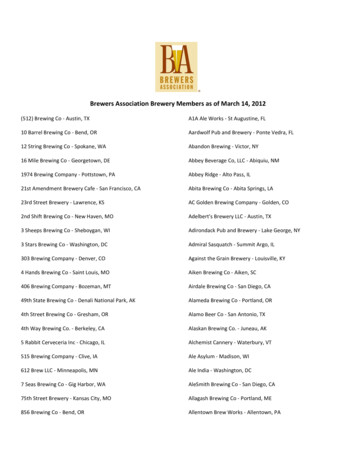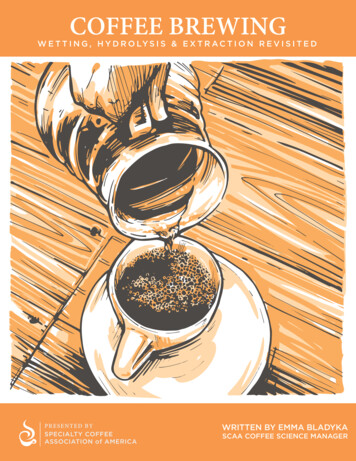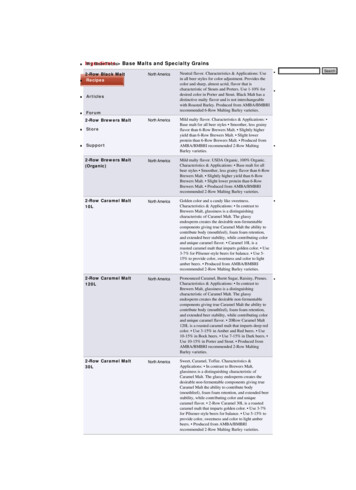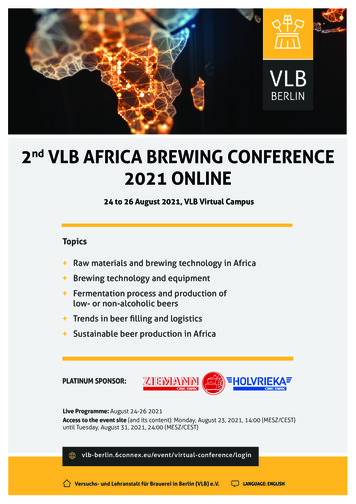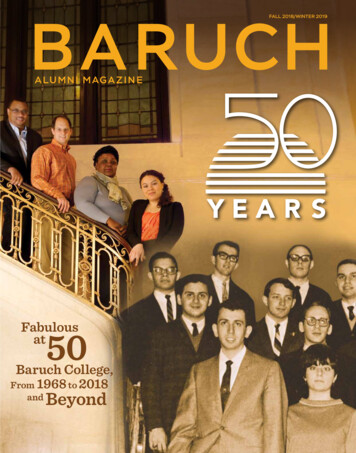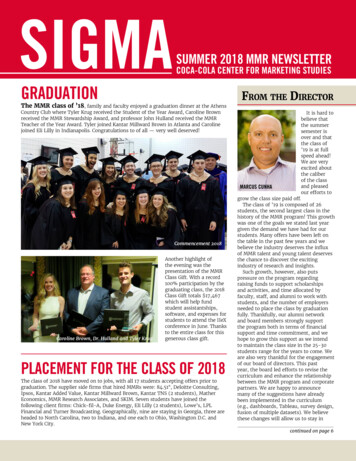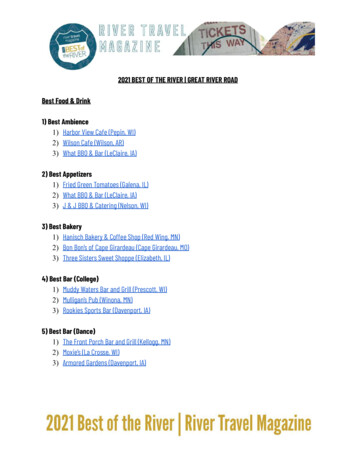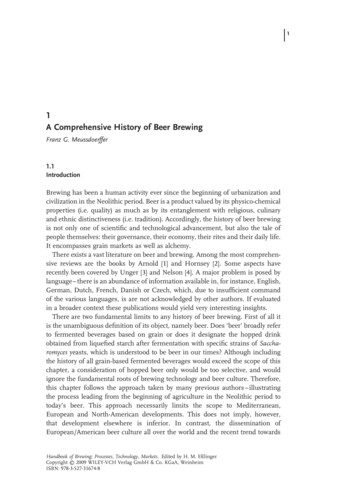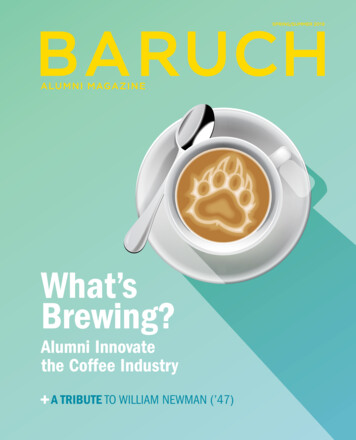
Transcription
What’sBrewing?Alumni Innovatethe Coffee Industry A TRIBUTE TO WILLIAM NEWMAN (’47)
Message from the PresidentWhether you are one of the students whom wecelebrated at Commencement on June 3, or youcount yourself among the nearly 150,000 BaruchCollege alumni who span the globe, I am certainthat you can recall a faculty member—or several—who had a big impact on your life.I still remember with fondness and awe a professor whotaught undergraduate political science, who shaped mykeen interest in public policy and motivated me to wantto serve in the U.S. government, which I later did forfive years before becoming the dean of one of the leadingschools of public and international affairs.Our faculty are the intellectual heart and soul of Baruch.People who pursue careers in academia are making acommitment to preserve and expand the knowledgebase of humanity. They do this through their ownscholarship and through the skills and understandingof the world that they impart to our students.In this spirit, I want to share some faculty-focused initiativesand updates from this past academic year. In August 2018,we welcomed one of the largest groups of new professors inmany years: 46 top-flight researchers and educators joinedthe institution across all three schools. They comprise abroad spectrum, ranging from promising new talent toestablished scholars, and hail from excellent institutionsfrom the U.S. and around the world.To mark their arrival—and to recognize the promotions,retirements, and achievements of the faculty as a whole—we hosted our inaugural Faculty Convocation, a specialcelebration that will become an annual fall tradition atthe College.With deep appreciation to generous alumni, we were alsoable to create four new endowed positions. At the ZicklinSchool of Business, Lawrence Zicklin (’57) endowed theNeuberger Berman/Zicklin Family Chair in Data Analyticsin Accounting, now held by Vernon Richardson, PhD, andMarvin C. Schwartz (’62) created the Neuberger Berman/Schwartz Family Chair in Finance to focus on cutting-edgetechnology. A search is currently underway to fill the role.With great thanks to ongoing support from Austin W.Marxe (’65), the Marxe School of Public and InternationalAffairs welcomed two internationally recognized scholars:Asli Leblebicioglu, PhD, associate professor and MarxeChair in International Economics and Governance, andDesmond Arias, PhD, professor and Marxe Chair ofWestern Hemisphere Affairs.This was also a milestone year for the Eugene M. LangJunior Faculty Research Fellowships, which for two decadeshave supported early-career faculty in the publicationof their work. This ongoing gift from Eugene M. Lang(1919–2017), through the Eugene M. Lang Foundation,has provided more than 100 fellows with the opportunityto grow and pursue innovative research across all disciplines.Faculty, along with graduates and alumni, were additionallyhonored at Commencement 2019, which marked the endof Baruch’s 50th anniversary year as an independent seniorcollege in The City University of New York system. I hopeyou were able to celebrate with us in person, online, orby reading about the many achievements of our faculty,students, and alumni in the pages of this magazine.I wish you a relaxing and enjoyable summer!Our faculty are the intellectual heart and soul ofBaruch. People who pursue careers in academia aremaking a commitment to preserve and expand theknowledge base of humanity.”President’s photo by Karsten Moran“Sincerely,MITCHEL B. WALLERSTEINPresident, Baruch College
IN THIS ISSUESPRING/SUMMER 20196 COVER STORYBaruch Alumni MagazineGrounds for Success: What Are BaruchCoffee Entrepreneurs Brewing?Cheryl de Jong–LambertDirector of CommunicationsDiane HarriganThe coffee industry has never been hotter, and Baruch alumniare at the center of the action. From instant-coffee innovators tocold-brew pioneers, coffeehouse owners to responsible roasters,meet four alumni who are shaping this growing industry, onedelicious cup at a time. Says Angela Austin (’07) (shown),co-owner of Milk & Pull, “Coffee is so much more than a fix.It’s how conversations start.”EDITOR IN CHIEF:Added Perk: Learn about the history of coffee at the College—fromWorld War II to today—and how caffeinated beverages play andhave played a pivotal role in campus life.David Shanton, Vice President of CollegeAdvancement3 CAMPUS HIGHLIGHTMore to Celebrate: The Marxe School at 25Since its founding in 1994, the Austin W. Marxe School of Public and International Affairs—New York City’s only public graduate school dedicated to public affairs—has established itself asone of the nation’s leading programs in policy and administration. Says Baruch President MitchelB. Wallerstein, PhD, “There has been no greater transformation on campus in my nearly 10 yearsas president than the gains the Marxe School has made.”17 ALUMNI TRIBUTERemembering Bill Newman (’47)Real estate industry legend and visionary alumnus William Newman sawBaruch College’s renaissance long before most people thought it was possible.Says his friend and Baruch benefactor Lawrence Zicklin (’57), “Bill understoodthat this school is a beacon for so many.” Read how the Newman family’sdecades-long philanthropy helped define Baruch as a new national modelfor urban public education.ALSO INSIDE2 NEWS & NOTESPoet and DistinguishedProfessor of EnglishGrace Schulman, PhD,joins the country’sgreatest architects, artists, composers, andwriters as one of the newest members of theAmerican Academy of Arts and Letters.12 CLASS NOTESA Baruch education was the rightprescription for Mark Smiley,MD (’07). With the help ofthe Percy E. Sutton SEEKProgram, he realized hisdream of becominga physician.SENIOR EDITOR:Gregory M. LeporatiGRAPHIC DESIGN:VanguardOFFICE OF ALUMNI RELATIONSAND VOLUNTEER ENGAGEMENTJanet B. Rossbach, Director of AlumniRelations and Volunteer EngagementBaruch Alumni Magazine 2019 by Baruch CollegeThe City University of New YorkPlease address all editorialcorrespondence to:Baruch Alumni MagazineOffice of Communications, Marketing& Public AffairsOne Bernard Baruch Way, Box A-1503New York, NY 10010-5585email: communications@baruch.cuny.eduPlease send all inquiries aboutthe Baruch College Fund, as well asaddress changes, to:The Baruch College FundOffice of College AdvancementOne Bernard Baruch Way, Box A-1603New York, NY 10010-5585phone: 646-660-6060email: bcf@baruch.cuny.eduFor information about alumni programsand activities, please contact:Baruch College Office of Alumni Relationsand Volunteer EngagementOne Bernard Baruch Way, Box A-1603New York, NY 10010-5585phone: 646-660-6097email: alumni@baruch.cuny.eduonline: alumni.baruch.cuny.eduBaruch Alumni Magazine onlinebaruch.cuny.edu/bamSPRING/SUMMER 2019 1
NEWS&NOTESFront-Office Front RunnerBARUCH A LEADER IN LANDING PREMIER INVESTMENT JOBSA SPOT AT THE NATIONALS: As one of two top finishers in the Northeast regional qualifiers, held in Boston,a team of six Baruch accountancy students headed to Dallas, TX, for Deloitte & Touche LLP’s annual AuditInnovation Campus Challenge. To earn their spot at the spring nationals, the Zicklin team competed againstregional teams from Boston College, Fordham, and St. John’s, among others. Shown after their qualifying win inBoston, from left: Syed Hussain, Brittany Plotnikov, Eimi Ogura, Ruby Dong, Ellis Hamabuchi, and Derek Lee.2 BARUCH ALUMNI MAGAZINE baruch.cuny.edu/bamPoet-Professor JoinsAcademy PantheonOnly 250 world-renowned architects,artists, composers, and writers areelected to membership in the AmericanAcademy of Arts and Letters. In MayDistinguished Professor of English GraceSchulman, PhD, joined the extraordinarylist of current members, which includesartist Christo, composer Philip Glass,writer Toni Morrison, and architect I.M.Pei. Membership in the prominent honorsociety, founded in 1898, is “consideredthe highest form of recognition of artisticmerit in this country,” according to theacademy.Dr. Schulman is an acclaimed poetand the author of seven collections ofpoems. Her most recent work is thememoir Strange Paradise: Portrait ofa Marriage (2018). Her service to theartistic community includes long-heldposts as poetry editor of The Nationand director of the Poetry Center atthe 92nd Street Y.“Professor Schulman’s induction intothe American Academy of Arts and Lettersis the climax of a long and distinguishedcareer as poet, writer, editor, and, ofcourse, teacher,” says Aldemaro RomeroJr., PhD, dean of the Weissman Schoolof Arts and Sciences. “It is as proud amoment for the Weissman School asit is for her, and it brings the highestlevel of national recognition that sheso richly deserves for her extraordinaryaccomplishments.”Schulman photo by Ozier MuhammadSecuring a front-office job with a financial industry powerhouse is a long shot at best.According to trade publication eFinancialCareers, individuals have about a 4 percentchance overall of receiving an offer if they apply for a spot at Goldman Sachs, for example.Without an Ivy League education, those odds drop.Given this fiercely competitive environment, the recent news of Baruch’s inclusionon two Top 25 lists from eFinancialCareers—for alumni getting front-office jobs at J.P.Morgan and at Goldman Sachs, two of the world’s premier investment firms—was thecause of much celebration. Baruch placed #5 for front-office jobs at J.P. Morgan and #19for Goldman Sachs. On both lists, Baruch was among distinguished company, includingHarvard, Stanford, the University of Chicago, and Cornell in the U.S. and Oxford andCambridge in the U.K.“We are proud that our graduates are being hired by top financial firms,” saysH. Fenwick Huss, PhD, Willem Kooyker Dean of Baruch’s Zicklin School of Business.“Such rankings confirm that Zicklin programs prepare students to compete at thehighest levels in the global business marketplace.”Since 2007 Baruch’s Starr Career Development Center has also helped studentsgain entry into this rarefied world through the Financial Leadership Program (FLP).“Dedicated to the professional development and advancement of high-potential juniorsinterested in careers in finance, FLP has a history of cultivating successful financeprofessionals,” says Ellen Stein, PhD, center director, who credits FLP alumni withblazing the trail for future Baruch graduates hoping to apply for these coveted positions.The eFinancialCareers rankings are based on the total number of alumni from eachcollege or university currently working at these financial institutions, as identified throughLinkedIn, combined with employment data from an eFinancialCareers database.
NEWS&NOTESMore to Celebrate: The Marxe School at 25Ramos photo by Pete SouzaThe year was 1994. With deep budget cutslooming at The City University of NewYork, it seemed an inauspicious momentto launch a new school at any of CUNY’scampuses. So it was with a large measure ofchutzpah—as well as sound planning—that theSchool of Public Affairs was founded at BaruchCollege. Today, even as it celebrates its25th anniversary as the recently named andendowed Austin W. Marxe School of Publicand International Affairs, the school stillreflects its mission-driven, risk-taking origins.The school’s accomplishments belie itsrelative youth. Since its founding, the MarxeSchool—New York City’s only public graduate school dedicated to public affairs—hasexpanded programming, tripled the size ofits faculty, quintupled enrollment, grown itsalumni network to 8,000 strong, and firmlyestablished itself as one of the nation’sleading programs in policy and administration.“There has been no greater success storyon our campus in my nearly 10 years aspresident than the transformation of theMarxe School of Public and InternationalAffairs,” says Baruch President Mitchel B.Wallerstein, PhD, who holds a facultyappointment in the school. “Its growth andexpanded roster of academic offerings andfaculty make this an exciting and dynamicmoment for the Marxe School, its facultymembers, and its students.”Just days before the official anniversaryparty on March 14, U.S. News & WorldReport named the Marxe School to its“2020 Best Graduate Schools” list. Amongpublic institutions, Marxe’s Master of PublicAdministration (MPA) program ranked #2in New York State. The school tied for #39in the U.S. out of 285 public and privateinstitutions nationwide.All along, alumni support has beenvital. Among the first and most significantbenefactors was Amy Hagedorn (’58), whomade two 1 million gifts. Then, in 2016, AustinW. Marxe (’65) gave the school 30 million,the largest single gift in Baruch’s history.When the school was renamed the AustinFACULTY INFLUENCERS RAISE THE MARXE SCHOOL PROFILE: Alumnus William A. Ramos (NUFMPA ’06) (left) returned to Baruch College this year as an adjunct lecturer and member of the Dean’s AdvisoryBoard at the Marxe School. He is the former director of intergovernmental affairs, Office of the Secretary atthe U.S. Department of Commerce, and a member of the administration-wide White House IntergovernmentalAffairs team for the entire eight years of the Obama administration. Mr. Ramos hosted 11 Baruch MPA studentsand several CUNY Rogowski interns during his tenure in the administration. Of teaching at Baruch, he says,“Helping young people realize their potential is as much a legacy as an inheritance.”W. Marxe School of Public and InternationalAffairs in his honor, one of its most importantshifts was announced to the world.Since the early 2000s, the then Schoolof Public Affairs had begun to embrace theglobal aspects of its mission, with changesto the curriculum and to the faculty (mostnew hires conduct research in at least onecountry outside of the U.S.). Perhaps the bestexample of Marxe’s global engagement is theMaster of International Affairs degree program,which graduates its first class in June.“Our graduates go on to outstandingcareers in the public and nonprofit sectors,lifting communities through their innovativework,” says David Birdsell, PhD, Marxe Deanand a member of the Baruch faculty since1986. “We continue to see the impact thatthe Marxe School makes on the city, state, andworld, and we know the best is yet to come.”Paws-ing to RelaxThis March the Undergraduate Student Government (USG) arranged for comfortdogs and their handlers to be brought to campus during Spring 2019 midterms.The event, which required reservations, was extremely popular,with all spots (no pun intended) filling quickly.Lucky students secured 10-minute appointments to interactwith four certified therapy dogs—Mooky, Willy, Murphy, and April(shown here)—from New York Therapy Animals. “It was a reallyawesome stress reliever,” said Ana Rodriguez (’21). “While Iwas playing with the dogs, I kind of forgot all of the otherassignments and stuff that was worrying me.”In support of Baruch’s hardworking students, the USGhopes to make this a tradition during midterms and finals.— ORIGINAL REPORTING BY AYSE KELCE (’22) AND PHOTOGRAPHYBY DAPHNELLY DELACRUZ (’19) FOR THE TICKERbaruch.cuny.edu/bam SPRING/SUMMER 2019 3
NEWS&NOTES& AntlersThis year the Department of Natural Scienceswelcomed two intriguing new assistant professorswith unusual areas of specialization: myrmecologistSarah Bengston, PhD, and comparative anatomistZachary Calamari, PhD.Dr. Bengston came to myrmecology, the study ofants, by way of an interest in animal behavior. Whilestudying colonial spiders, she realized that the questionsshe was researching might be better answered studyingthe archetype of sociality: social insects. Ants were thelogical choice, she laughs: “I’m allergic to bees!”Bengston’s research focuses on understanding howand why there is variation in behavior between individuals,which, she explains, “has important implications for theecology and evolution of a species.” She extols ants asmodels of cooperation and coordination: “Ants accomplishthe hundreds of tasks they perform in unison using a setof relatively simplistic rules and extraordinarily complexforms of communication.” Bengston currently teachesThe History and Evolution of Life and The Fundamentalsof Ecology and has designed a new course, Animal Behavior,that will be offered starting in Fall 2020.Dr. Calamari’s interest in comparative anatomy stemsfrom a boyhood fascination with dinosaurs. As an undergrad,he researched the diversity of fossil mammals and found thatcompelling questions about the evolution of horns andantlers—appendages reminiscent of the crests on hisbeloved hadrosaurs—remained unanswered. “Comparativeapproaches give us a powerful way to understand evolution.Using the context of evolutionary relationships, we can tracehow certain traits have changed throughout the history oflife on Earth,” he says.Calamari understands the general population’s fascinationwith horns and antlers. “Horns and antlers are charismatic!”he says. “They signal an individual’s quality to other membersof its species, but also to us, which is why trophy hunting hasfocused on animals with large antlers or horns.” A researchassociate in the division of paleontology at the AmericanMuseum of Natural History, Calamari teaches ComparativeVertebrate Anatomy and Fundamentals of Biology at Baruch.The Rhodes of China: Recent GraduateBecomes Baruch’s First Schwarzman Scholar4 BARUCH ALUMNI MAGAZINE baruch.cuny.edu/bamDiallo photo by Nadia GomezWeeks before graduating with a BBA in finance in December, Abdourahamane Diallo (’18)learned that he would be heading to Tsinghua University in Beijing as Baruch’s first SchwarzmanScholar. One of only 147 award recipients chosen this year, he was selected from more than2,800 applicants worldwide and will join a group from 38 countries and 119 universities.Inspired by Oxford’s Rhodes Scholarship, the fully funded Schwarzman Scholarship Program—knownas the “Rhodes of China”—was launched in 2016 to prepare future leaders to meet the geopoliticalchallenges of the 21st century, especially in relation to China’s increasing importance as a globalpower. Schwarzman Scholars are selected based on their academic ability, leadership potential,character, and motivation.Mr. Diallo’s impressive résumé is emblematic of the program’s high standards. While attendingBaruch, he interned with Blackrock Inc., the U.S. Department of Commerce, and JPMorgan Chase.An active member of several student organizations, including Le Club Français, Baruch Toastmaster,and Sigma Alpha Honor Society, Diallo founded the Guinean Students Association at Baruch andexpanded the club to other CUNY campuses. He also volunteered with the Weissman School’sDepartment of Mathematics as a note taker for disabled students. Off campus, he was andcontinues to be active in his Bronx community.In August, Diallo and his classmates will begin Tsinghua University’s one-year master’s degreeprogram in global affairs, which is taught in English. The Baruch alumnus’s long-term goals includedeveloping the skills and networks to help his Guinean homeland become a “bigger player in theglobal market in terms of trading.”Says Valeria Hymas, Baruch’s deputy director of National and Prestigious Fellowships Advising,“Abdourahamane’s success should serve as an inspiration to all Baruch students that prestigiousfellowships are well within their grasp.”
NEWS&NOTES800,000 Views and CountingChampionship HoopsShot Goes ViralWBasketball photo by Denis Gostev (’13); Weaver photo courtesy of The Lexicon 1969College DebutsLecture SeriesPoised to leave an enduring legacy atBaruch College is the new Robert C. WeaverPresidential Lecture Series, established tocommemorate Baruch’s 50th anniversaryas a senior college in The City Universityof New York system. The annual series,which launched on April 18, is namedin honor of Robert C. Weaver, PhD,Baruch’s first president. Dr. Weaver, inthe photo above, previously served as thefirst U.S. Secretary of Housing and UrbanDevelopment from 1966 through 1968.Delivering the inaugural lecture, “Leadingfrom the Center,” was Arcadia UniversityPresident Ajay Nair, PhD. An accomplishedscholar of social justice, race, and ethnicityand a nationally recognized expert in studentaffairs issues, Dr. Nair is a pioneer in hisown right: he is among the first college oruniversity presidents of Indian Americandescent in the U.S. His lecture focusedon higher education’s mission in the 21stcentury and what it takes to be influentialin the current context.“The Robert C. Weaver PresidentialLecture Series was developed to focus onthe critical topic of diversity and leadershipand to honor the first president of BaruchCollege,” says Baruch President Mitchel B.Wallerstein, PhD. “Robert Weaver was thefirst African American appointee to Cabinetrank, serving in the administration ofPresident Lyndon Johnson. This continuinglecture series will be an important annualevent as higher education contends withthis important issue.”ith .2 seconds left in the basketball finals, forward Benjamin Boateng (’20)was ingeniously set up by his teammates to hit the winning shot againstthe College of Staten Island and clinch a dramatic 76-74 victory and earnthe Bearcats the CUNYAC 2018–19 championship. It was the third time in BaruchAthletics history that the men took home the conference trophy (the Bearcatsalso won in 2000 and 2015)—and the second time in the season that a playof theirs went viral and was amplified by ESPN.With seconds remaining and Staten Island defending,Baruch Head Coach John Alesi (’03) drew up a play morefitting for an NFL game than an NCAA Division IIIbasketball contest. Five Bearcats lined up behindthe end line, and the play started with an inboundspass from guard Bryler Paige (’19) to guard JackSixsmith (’19), who then found a streaking Boateng upfront to hit the winning shot. “We never practiced the play,”says Coach Alesi. “It was something we drew up during thetimeout.” The idea was to confuse the defense to create anopening to get the ball up the court quickly. It worked.Video of Boateng’s shot—which was made duringa February 22 game—went viral, with one tweetgarnering more than 800,000 views. Yahoo Sports,Barstool Sports, and prominent ESPN analyst FranFraschilla were among those who retweeted it.“It’s surreal,” says Boateng. “To this day, I still getreactions. It’s kinda crazy, but in a good way.”Just 11 days earlier, a Bearcat clip of a gameagainst Lehman College had hit the social mediastratosphere when Bryler Paige fell to the floor ashe scrambled for a loose ball. The clock was aboutto expire and from a seated position, he managedto hit a bank shot that helped secure the Bearcatvictory, 68-58. The shot was chosen as one of ESPNSportsCenter’s Top 10 Plays of the Night.“What a season!” said Heather MacCulloch,Baruch’s director of athletics and recreation. “I amso proud of our student-athletes for battling throughevery game with grit and never giving up. Theydeserved every bit of recognition those shotsgot them.”For years to come, these shots will beremembered as among the greatest in Baruchand CUNY Athletic Conference men’sbasketball history.—JOHN NEVESBenjamin Boateng (’20) hitthe conference-winning shot.baruch.cuny.edu/bam SPRING/SUMMER 2019 5
GROUNDSFOR SUCCESSAlumni EntrepreneursInnovate the Coffee IndustryBY GREGORY M. LEPORATICollege and coffee go hand in hand, and Baruch is no exception.During midterms and finals, especially, students buzz around the NewmanVertical Campus between study sessions swigging Starbucks or nitro cold brews purchased fromone of the food trucks or boutique coffee shops popping up throughout the neighborhood. It’sno surprise, then, that Baruch alumni continue their love affair with coffee long after graduation.But they’re not only drinking it—they’re selling it, as Baruch entrepreneurs are making their markon what has become a 20 billion global industry.From running hip coffeehouses to supporting responsibly sourced beans, owning trendy cold-brewcompanies to innovating instant coffee, meet four alumni who are helping to shape this growingindustry, one flavorful cup at a time.Star Power“The second wave of specialty coffee had hit its stride,” Steingardrecalls, “and there were a lot of great socioeconomic issuesthat the industry was addressing: sustainability, transparency,responsible sourcing, and so forth. Hugh had just come backfrom a trip to Ethiopia, helping with humanitarian projects, andwe felt it was the right time to get this off the ground.”Since then, Laughing Man has grown into a major brand. Thecompany has two New York City cafés, and Walmart, Target,and Amazon sell its ground coffee and Keurig cups nationally.Through it all, the company supports Mr. Jackman’s LaughingMan Foundation, which provides new homes and scholarshipsto the families of coffee farmers in Ethiopia.David Steingard (’99)6 BARUCH ALUMNI MAGAZINE baruch.cuny.edu/bamSteingard-Jackman photo courtesy of Laughing Man Coffee“Technically speaking, coffee has more flavor profilesthan wine,” says David Steingard (’99). The energeticBaruch alumnus reclines in his basement office in Tribeca, hisvoice brimming with excitement as he talks about his favoritebeverage. A former criminal prosecutor in Brooklyn, Mr. Steingardco-founded Laughing Man Coffee Company in 2011 with hisfriend actor Hugh Jackman. Steingard gravitated toward theindustry partly because his family had a history in the business—his parents owned the Cupping Room Café in SoHo—and partlybecause he saw it as the perfect platform to do good.
GROUNDS FOR SUCCESS“Coffee is a family and community business,”Steingard explains, “which is why it’s importantto do things holistically, to raise the entirefarming community up and make an impact.”David Steingard (’99) founded Laughing ManCoffee in 2011 with his friend actor HughJackman (right).Make no mistake, in addition to supportinga good cause, Laughing Man also knows howto brew a mean cup of coffee. Steingard’s eyeslight up as he discusses the intricacies ofroasting. “There are three components tomaking a good cup of coffee,” he explains. “Thecoffee itself, the grind, and the temperature.And that leads to more complexities: howyou caramelize the sugars as they roast, thewaves, the graphs, and so much more.”While coffee may indeed be one of themost complex beverages around, Steingardrecognizes that some customers just wanta good caffeine fix. “Consumers understandthat wine is a complex drink, but they haven’tquite reached that level of understandingwith coffee,” he explains. Steingard predicts,though, that coffee consumers will get moresophisticated, and purveyors will reflect thatgrowing understanding. “That’s why coffeeremains such a growth industry.”take the plunge. After doing some research,she and her husband opened Milk & Pull—on top of their full-time day jobs. The shopmade an immediate connection with theneighborhood. Since then, their enterprisehas expanded to three locations acrossQueens and Brooklyn, each shop creatinga welcoming environment with hip ambiance,friendly baristas, and cozy seating.“In a sense, coffee runs in my family,”says Ms. Austin as she sits in a quaintcorner of her most recent Milk & Pulllocation in Bedford-Stuyvesant, Brooklyn.“My grandfather owned coffee farms inColombia, before guerrillas took his landand my family was displaced. This is sortof my way of bringing my family back intothis business.”Running Milk & Pull is no easy feat. Austinalso serves as director of Verizon CreativeMarketing, an in-house ad agency withinthe telecommunications powerhouse, whereshe spends the bulk of her days working oncomplex marketing campaigns. Running abusiness on top of her corporate job makesfor long days—and nights—but it’s worth itwhen she sees her coffeehouses filled withhappy customers.“Local coffee shops are making a hugecomeback,” she explains. “Starbucks openedthe door, but hyperlocal shops provide thatquality, personal touch. Nowadays peopleget to know their barista, and it becomesa neighborhood connection.”Just like Steingard, Austin senses thatconsumers are becoming more knowledgeableabout coffee and more eager to try new things.Her shops serve coffee from Stumptown CoffeeRoasters—a popular roaster headquarteredin Portland, Oregon—and feature adventurousblends. “Coffee is so much more than a fix,”she explains. “It’s how conversations start.You try a new blend, you chat with yourbarista about what makes it unique, and youlearn more about the complexities of coffee.”A corporate communications major at Baruch,Austin credits the College with instilling in heran entrepreneurial spirit and a willingnessto take risks. Of the student experience, shesays, “You’re in the middle of Manhattan—part of its bustling spirit—and that makes youwant to build something.” Graduating with nodebt also helped make her dream possible.“I was able to jumpstart my life without thatcrazy weight on my shoulders,” she explains.The alumna hopes to continue to expandMilk & Pull in the near future, especially asbusiness keeps booming. “We never intendedfor this to be a cash cow or anything,” shesays. “It was just a passion project—ourlifestyle, really—and it’s amazing that we’rehaving this impact on the local community.”Local BrewWhen Angela Austin (’07) movedin with her then boyfriend–nowhusband to Bushwick, Brooklyn, she faceda dilemma: “There were no good coffeeplaces nearby!”She had long fantasized about opening acoffee shop and decided that it was time toAngela Austin (’07)baruch.cuny.edu/bam SPRING/SUMMER 2019 7
GROUNDS FOR SUCCESSAn Instant UpgradeHigh-quality coffeehouses andexotic blends are great, butwhat about consumers looking for speedand convenience? Those who favor instantcoffee have always had to settle for inferiorquality, but those days will soon be overif David Kovalevski (’17) has anything tosay about it.Originally from Israel and currently living inLos Angeles, Mr. Kovalevski founded WakaCoffee last year to bring gourmet-qualityinstant coffee to the masses. “Instant coffeeis way more popular internationally than inthe United States,”
Baruch College's renaissance long before most people thought it was possible. Says his friend and Baruch benefactor Lawrence Zicklin ('57), "Bill understood that this school is a beacon for so many." Read how the Newman family's decades-long philanthropy helped define Baruch as a new national model for urban public education.
